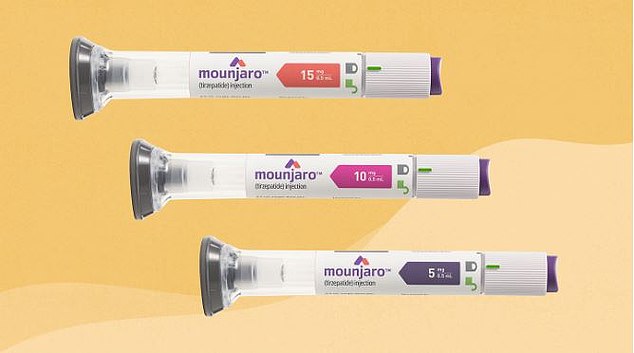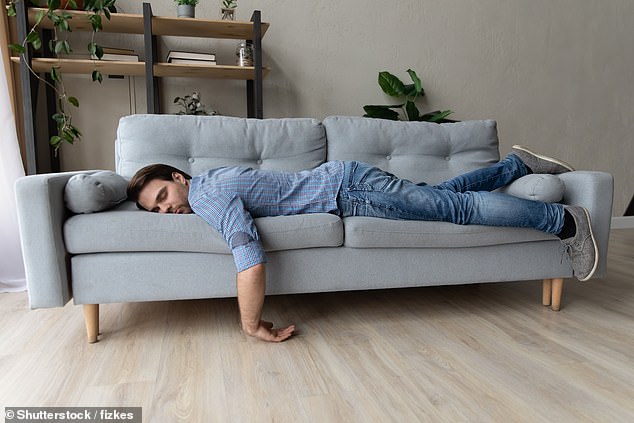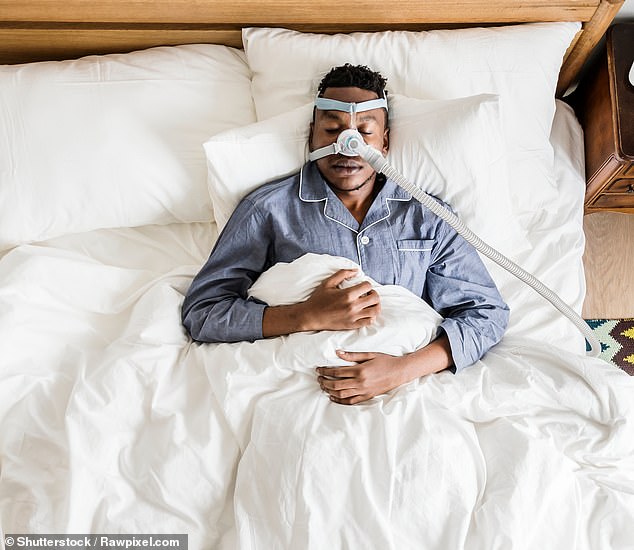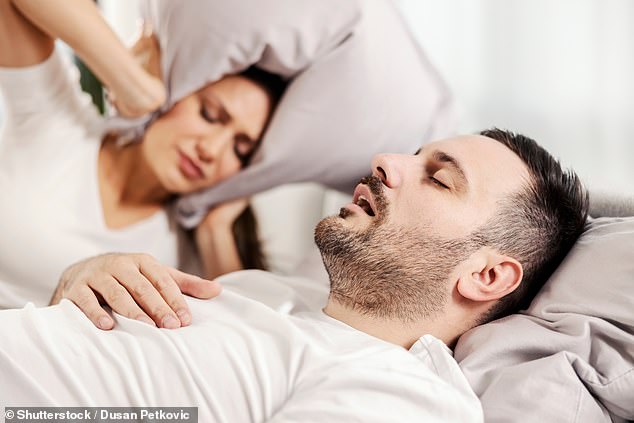Patients with the most common sleep disorder could be offered pioneering injections to lose weight and combat this potentially life-threatening condition.
More than 1.5 million people in the UK suffer from sleep apnea, where intense snoring disrupts breathing.
The condition leaves sufferers exhausted due to lack of sleep and increases the risk of developing high blood pressure and heart disease.
But groundbreaking new research has found that tirzepatide injection for weight loss dramatically reduced the frequency of apnea symptoms, increasing the amount of sleep participants got.
While people are at greater risk for sleep apnea as they age, the most common cause of the condition is obesity.
The weekly injection works similarly to the popular weight loss drug Wegovy.
More than 1.5 million people in the UK live with sleep apnea, where intense snoring disrupts their breathing (file image)

But groundbreaking new research has found that tirzepatide injection for weight loss (pictured) dramatically reduced the frequency of apnea symptoms, increasing the amount of sleep participants got.

People with sleep apnea experience a complete collapse of the muscles in the upper trachea, which can temporarily stop breathing. stock image
Studies suggest that tirzepatide is twice as effective, leading researchers to call it the “King Kong” of weight-loss drugs.
Experts say it could save the lives of NHS patients with debilitating sleep apnea.
“This looks like a promising treatment,” says Dr. Christopher Turnbull, a sleep apnea expert at the University of Oxford.
«Sleep apnea has a huge impact on the lives of patients, who are more likely to develop heart problems.
‘Many struggle with their weight, which is the main cause of their apnea, but find it difficult to exercise or commit to a diet because they are exhausted from lack of sleep. “Anything that can help them lose weight would be a welcome addition to treatment options.”
The muscles in your airways relax naturally during sleep. But sleep apnea sufferers experience a complete collapse of the muscles in the upper trachea, which can temporarily stop breathing.
People with this condition often make choking, gasping, and snorting noises, and wake up frequently, sometimes every few minutes.
Stopped breathing also causes spikes in blood pressure, which stresses the heart.
Patients with sleep apnea are twice as likely to suffer a stroke and 80 percent more likely to develop heart disease than those without the condition.
In 2016, the death of Star Wars actress Carrie Fisher was attributed to severe sleep apnea combined with heart disease. However, the disease predominantly affects men. Research suggests that excess weight can cause a buildup of fat around the neck, as well as an increase in the size of the tongue.

In 2016, the death of Star Wars actress Carrie Fisher (pictured in 2011) was attributed to severe sleep apnea combined with heart disease.

Carrie Fisher playing Princess Leia in Star Wars: The Empire Strikes Back in 1980

However, the disease predominantly affects men. Research suggests that excess weight can cause a buildup of fat around the neck, as well as an increase in the size of the tongue (file photo)

One of the most common treatments for sleep apnea is called continuous positive airway pressure (pictured). Patients wear a mask while they sleep that pumps air into the mouth and nose to ensure the windpipe remains open.
These changes increase the chances of the trachea becoming blocked during sleep.
One of the most common treatments for sleep apnea is called continuous positive airway pressure (CPAP).
Patients wear a mask while they sleep that pumps air into the mouth and nose to ensure the windpipe remains open.
However, CPAP cannot cure sleep apnea and many users find the machine uncomfortable.
“CPAP is very effective but quite burdensome for the patient,” says Dr. Turnbull.
Experts believe tirzepatide could be a possible alternative to CPAP after a US study involving almost 500 obese participants concluded that the injection reduced sleep apnea symptoms by almost two-thirds.
Sleep apnea studies often look at the number of obstructive “events” patients experience: the number of times they stop breathing.
The new findings, published by the drug’s developer, Eli Lilly, show that patients who received tirzepatide experienced about 30 fewer events per hour than those who did not receive the treatment.
Crucially, this was roughly similar to the benefits seen in patients using CPAP.
Experts say these surprising results are due to the weight loss seen in the participants, who, on average, lost about a fifth of their body weight.
Tirzepatide mimics the GLP-1 hormone in the intestine that helps with the release of insulin, a hormone that regulates blood sugar. It also suppresses appetite, leading to weight loss.
“Many sleep apnea patients respond well to CPAP and would prefer not to take medication,” says Kath Hope, founder of the charity Hope2Sleep.
“But for those who struggle with CPAP and suffer from untreated sleep apnea, this could be a great option.”


